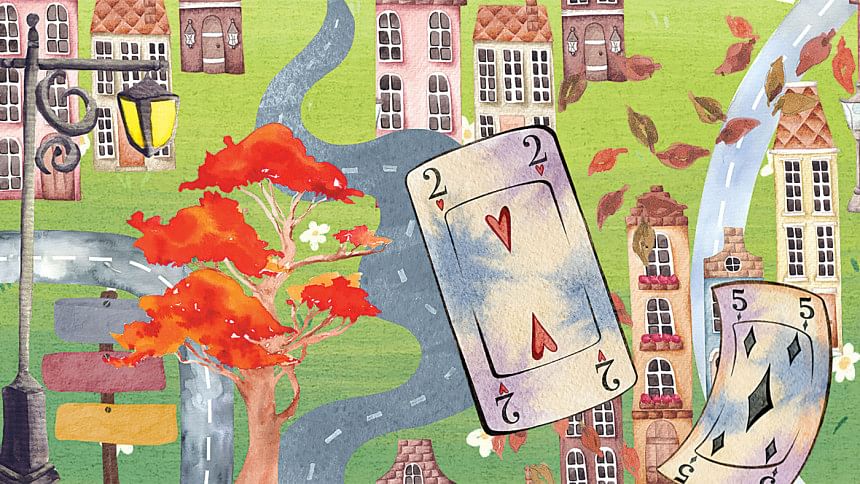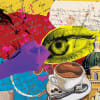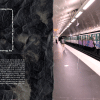The first American months

The sun was up. The sky was a perfect cerulean blue, the neighborhood blissfully quiet. Through my window, I relished the sunny first day of 2020, with a cup of tea in my hand. The brown picket fence of my apartment flanked a narrow pavement that connected Hialeah Drive, the main street of the neighborhood. Last semester, it was my usual route to school, a ten-minute walk from the apartment, especially when I woke up early and had time to cook an egg or make some French toast and tea. Taking this longer route, I crossed Maryland Pkwy and walked through UNLV Student Union, the hub of food stalls, a US Bank branch, an information desk, and lounging facilities, akin to TSC at Dhaka University from which I had graduated four years ago.
Here, I was like other Bangladeshis, always cautious, not wanting to break any rules intentionally or unintentionally. Structure and order that immigrants quickly adopt to participate in American life.
The shorter route to school was through my backyard and through other people's backyards, unfenced and dotted with dog poop. To use this route, I walked diagonally across Living Desert Drive down Ascot Drive to East Harmon, eventually crossing Maryland Pkwy without having to weave through the Student Union. It took six to eight minutes, or less if I jogged, to attend my only morning class, Modern American Fiction, during my first semester of MFA. Being a night owl, I had often missed my morning classes in Dhaka, but here in Vegas, an ever-expanding desert city, I couldn't afford to miss any classes, fearing a decline in academic performance that so mattered to international graduate students living on a meager stipend.
One day I was awfully late. I had hit the snooze button twice or maybe three times before realizing it was already past 8:30. I got ready as fast as I could, then took the shorter route, thinking of the cold expression on the professor's face when she would see me half an hour late into her lecture on John Dos Passos's The 42nd Parallel, an experimental novel with newsreels, stream-of-consciousness, and brief biographies of historical figures. I passed through my neighbors' garages and backyards, one, two, three. While crossing the fourth house, I saw a flash of grey and white fur streaking past me, frightened by my footsteps. It stopped before the dumpster between the houses and looked back. It was a grey cat, possibly a stray, with a bushy tail and rounded almond-shaped eyes. I didn't mean to frighten him by any means, but he was anyway and appeared shocked before he jumped up a wall, and giving me a contemptuous look, disappeared to a neighbor's porch. Later I discovered he ate every day in the garage of the fourth house, between eight and ten. Someone in that house made that schedule, and the cat followed it precisely. I was an intruder, disrupting this harmless daily affair. No matter how I tried to please him, no matter how I meowed and cooed and called him by friendly, imaginative names, he was always frightened to see me, always kept a safe distance. I called him Mr. Thoreau, a loner living on the fringes of society. The cat was watchful, reminding me of Naipaul's descriptions of crows in India, which he described as "Indian crows" and called them "rapacious and swift and watchful" (India: A Million Mutinies Now). I wondered what other special features I could think of the cat. How I wished I could see him more, spend a little bonding time, but I never did. We decided to settle with the status quo: we were to avoid each other carefully and mind our own business. Like him I was also going through a shock. Not by a person but by America in general.
The big shock was cultural. Everything seemed new, everything seemed different. Habits of my past twenty-five years were challenged. My legs wanted to cross the street when there were no vehicles around, but I had to press the button on the pole overlooking the pedestrian crossing, then I had to wait for the "walk" signal to appear, a white shape of a man pointing to the other side of the street. Of course, one could still jaywalk if there were no police around, like people did in New York and New Jersey and other busy, more populous cities. Here, I was like other Bangladeshis, always cautious, not wanting to break any rules intentionally or unintentionally. Structure and order that immigrants quickly adopt to participate in American life. I was left with only two choices: following my old habits and instincts or training myself into the ways of this new world. I decided to do the latter.
I made friends from my cohort. Mo was the first one. We met during our orientation, although he had texted me earlier on Facebook, asking me if I was interested in sharing an apartment with him; I politely refused, doubting that it would be productive for our writing. He was a fiction writer, had worked on a novel for the last couple of years and got an agent as well, who tried to find a publisher for him but without any luck so far. He had Bob Dylanesque features, natural, curly afro-like hair, a long, sharp nose, and large, dreamy eyes. He invited me to his apartment at the Degree, the official student dorm of UNLV, where another friend from my cohort, Christina, also lived.
It was the second week into the semester, and we were to write our first teaching journal—our experience of teaching in the past week. English 791 was a required course that graduate teaching assistants had to take to teach composition courses more confidently. I had no prior teaching experience, so this meeting at Mo's apartment was to get reassurances from my new friends. But instead of working on our journal, we chatted about my recent change in food habits. I was missing Bangladeshi food, the ingredients of which could not be found at Walmart alone, so I relied on other Bangladeshi students with cars who could take me to the nearest Indian grocery store. I met Sylvia that night, another incoming student from the fiction cohort. She was from Baltimore and had a boyfriend living in Scotland, whom I'd meet at a housewarming party a month later. As time passed, the conversation turned to writers we adored: Mo on Henry Miller, Kerouac, and Bolaño; Christina on Joan Didion and Alex Marzano-Lesnevich (writers I never knew before); and Sylvia on Toni Morrison, whom I also loved. As she emphasized how penetrating Morrison's prose was yet accessible to anybody, I couldn't resist adding that I found her voice so familiar. "It was as though my aunt was telling me a story," I said, making my cohort laugh. I mentioned the other writers I read: V. S. Naipaul, García Márquez, and Arundhati Roy. For hours we chatted and drank beer, following Mo's suggestion that we could drink anything from his fridge except for microwavable food in Tupperware. Until midnight we talked about Sylvia's Brazilian roots and Mo's Jordanian background, though both had grown up in the US. It was fun and exhilarating, but once we turned to songs, movies, and shows, I discovered a wide gulf between us. Many songs and movies my friends listened to and watched growing up in the US were not familiar to me. We all knew about the differences of cultures and origins, but to keep the conversation interesting, familiarity helps since jokes are lost in slow explanations.
Even in the composition class I taught, the movie clips I used to analyze rhetorical situations, I found my students were not familiar with many of them: The Joy Luck Club or The Post or Twelve Angry Men. They were not familiar with my background, especially with Bangladesh, asking me where it was, forcing me to give them a rundown of the country. I was puzzled. What could I possibly talk about my country other than its geographical location and a brief history of its genesis? It felt dumb, considering I never had to talk about Bangladesh like this before, to introduce it to a moderately curious audience. There were so many things to share, but to share those things my students needed more context, details that would be so unnecessary to a home audience. It was the first time that I had to think about the audience, which was also a course concept. I kept thinking about the ways I could use characters in my work without having to explain too many cultural nuances. Since the stories I was working on at that time were primarily for my fiction workshop, I sometimes felt like providing additional details, fearing things would otherwise be confusing to my colleagues. But luckily, both my fiction professors, Douglas Unger and Maile Chapman, emphasized that these details such as what an imam or kanamachi game is are unnecessary for intelligent readers who can infer their meanings from the context. But the idea of the audience haunted me when people sometimes assumed that I already knew about the things they were talking about, that I grew up knowing all the things that happened in America. It was as though the US was the default culture for the rest of the world.
During that first semester, I was invited to a Halloween party, where we played a game called Fishbowl. We were divided into two groups, given some strips of paper to write down some names (celebrities, sportsmen, writers, famous people in general). I randomly wrote three names: Priyanka Chopra, Shahrukh Khan, and Muhammad Yunus. The idea was to select a player from each team who would draw papers from a round, transparent bowl primarily used as an aquarium. The player would provide hints to their team members what that name on the paper might be, but she would not tell us the exact name. In other words, we had to guess the correct names. For example, if one picked a paper that read Bill Clinton, she would perhaps give us some hints about Clinton's affair with Monica Lewinsky, but she couldn't say Clinton's name directly. The team members would have to guess the name from descriptions she provided, and if they could guess the correct answer, they kept the piece of paper. After several rounds, each team would count how many names they had collected, the higher number of correct answers ensuring their win. The game wasn't very complex—it was simply new to me. Since most of my colleagues were familiar with the descriptions and hints on American celebrities and politicians, they answered pretty fast while I stammered a reply sometimes, mostly sitting silently. These names seemed new to me, new actors and singers and writers I didn't know anything about before. It was hard for me to guess things, and it was so with the names I had written in my papers. Some of them picked Priyanka Chopra and didn't have any idea what hints to give to their team members. Some of them mistook Shahrukh Khan for Sher Khan, the Bengal tiger in Rudyard Kipling's The Jungle Book. Muhammad Yunus was only an Islamic name to some. There was an awkward silence when the game reached this stage: unfamiliar, difficult names to guess. I felt bad for them; I could have chosen something American, so the game would continue more effortlessly. Suddenly I realized it was an equalizing moment, a hidden balance in the order of things.
Tough as it will always be for graduate students abroad, the first semester made me realize that my differences were part of my story, my strangeness, my strength. It was learning about the routes that best worked for a person in a new country, like the way I would go to school in those first few months in America, learning from everything around, even from Mr. Thoreau who knew I was around the corner, waiting for me to pass so he could enjoy his little meal peacefully. Next semester, I would befriend the cat, learning a little history about him from an elderly neighbor who left a bowl for him outside her door. I would feed him treats that I got from the 99 Cents Store, sometimes even recite a famous Jibanananda Das poem about a cat playing in the saffron sun and catching darkness with its paws, images of a world left behind.
Mir Arif is a Bangladeshi author living in Ohio. He is working on his novel, The Second Interpretation, while awaiting the publication of his story collection, Adrift. Find him @mirarif

 For all latest news, follow The Daily Star's Google News channel.
For all latest news, follow The Daily Star's Google News channel. 









Comments